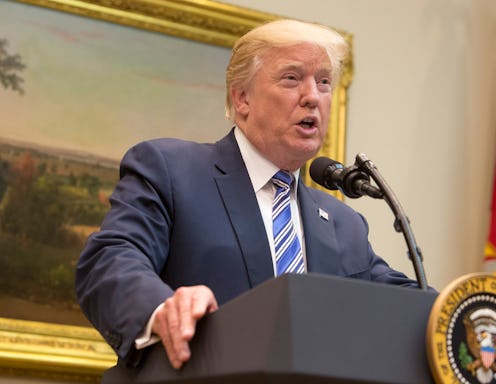News
President Trump Finally Declares The Opioid Crisis A "National Emergency"

After much encouragement, President Donald Trump declared the nation's opioid crisis a national emergency on Thursday. The announcement came just days after Trump last addressed the crisis, but he notably did not use the phrase "national emergency" at that time. Thursday's declaration seemed to pave the way for a federal strategy to mitigate the crisis' impact on the American people.
Speaking to reporters on Thursday, Trump clearly and definitively declared a national emergency. He spoke from his golf club in New Jersey, where he is currently taking a working vacation. Despite his distance from Washington, the president's declaration on Thursday sought to set things in motion back in the nation's capital. Said Trump:
The opioid crisis is an emergency, and I’m saying officially, right now, it is an emergency. It’s a national emergency. We’re going to spend a lot of time, a lot of effort and a lot of money on the opioid crisis.
"It is a serious problem, the likes of which we have never had," the president continued. Trump's sentiment echoed what experts have been saying for months, if not years. According to the American Society of Addiction Medicine, drug overdose is the leading cause of accidental death in the United States, with the opioid crisis driving many of those deaths.
In 2015, per the most recent data available, 20,101 drug overdose deaths in the United States were related to prescription painkillers. Similarly, 12,990 drug overdose deaths were related to heroin. The opioid crisis spans legal painkillers, like morphine and oxycodone, as well as illegal opioid substances, like heroin.
Last week, the federal opioid commission, led by Trump appointee Chris Christie, recommended that the president declare a national emergency. In an interim report, the commission urged Trump to make the declaration as a way of inspiring urgency within the executive branch. "Our citizens are dying," the report read. "We must act boldly to stop it." The report also outlined several steps the federal government could take to address the crisis.
For his part, Trump did not go into such detail about the next steps. It seems that will be for his administration to figure out. The declaration of a national emergency certainly paves the way for action to occur though. With a national emergency on the books, the president and his administration can more readily mobilize funding and streamline certain regulatory processes. According to Vox, the federal government could choose to strengthen prevention programs, increase access to addiction treatment, and make the anti-overdose drug naloxone more widespread.
As of Thursday evening, it wasn't clear which steps the president and his team would take. To many, the declaration of a national emergency alone was a step in the right direction, particularly after Trump's hesitancy earlier in the week. "I'm confident that by working with our health care and law enforcement experts we will fight this deadly epidemic and the United States will win," the president said on Tuesday. Thursday's declaration, then, represented a greater sense of urgency from the president.